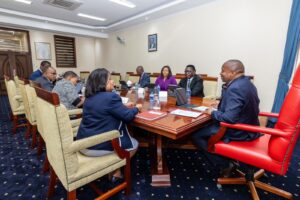Gathoni Wamuchomba, HSC. And Nguvu Change Leaders Join Forces In Fight To Eradicate Obstetric Violence Against Women In Kenya

On International Day for the Elimination of Violence against Women (November 25), GAMAFRICA Foundation & Nguvu Change Leaders appealed for a National Policy on Obstetric violence.
In a landmark alliance for change, Gathoni Wamuchomba joins forces with three bold Nguvu Change Leaders to combat Obstetric Violence (OBV) in Kenya, marking a pivotal moment following the International Day for the Elimination of Violence against Women that was observed on November 25th.
Given her own recent efforts involving the presentation of a proposal at the National Assembly for the creation of a National Policy on OBV, Wamuchomba now has strong backing from Harriet Afandi, Josephine Mwende, and Deborah Monari, three young women who have been championing respectful healthcare for women in Kenya.
Wamuchomba herself is no stranger to OBV and has recently launched a campaign called “Heshimu Uzazi”, aptly translated as ‘Respect for Mothers’. She recalls, “Across delivery rooms and maternity wards in Kenya, many women remain similarly unassisted and neglected as they struggle through childbirth, it is even worse if it involves women with disability. This is gender-based violence and needs to stop immediately! The stories of Harriet, Josephine, and Deborah, and scores of other women being mistreated in hospitals resonate with me and are indicative of the urgent need for legislation against the neglect and abuse that women are subjected to.
‘Obstetric Violence’ is an intersection between institutional violence and violence against women that remains a cause of grave concern in the country. In 2016, data from the Ministry of Health, the National Nurses Association of Kenya, the Federation of Women Lawyers, and the International NGO Population Council indicated that one in five women giving birth in local hospitals across Kenya is humiliated, abused, and asked for a bribe.
Harriet Afandi, a Nguvu Change Leader from Vihiga County is well aware of the toll such neglect takes on an expecting woman. She shares, “My sister had to undergo an emergency C-Section surgery 11 days after her due date because her clinical nurses told her that it was not the ‘right time’ yet. This delay caused by sheer oversight could have led to the loss of my sister and her baby.” She believes that the “Heshimu Uzazi” campaign efforts will safeguard pregnant women from neglect and negligence.
Josephine Mwende’s petition is rooted in lived experience as she sheds light on the appalling discrimination she faced as an expecting mother with cerebral palsy. “I was rejected by one hospital after another because of my condition. It was heartbreaking when a doctor told my mother, ‘We don’t handle such people!’” She finally delivered her baby at Kenyatta National Hospital and says, “Despite the misconception that women with cerebral palsy cannot or should not bear children, I not only gave birth to my son but also named him, ‘Gift.’ I hope no woman with cerebral palsy ever faces the pain, rejection, and humiliation that I went through.”
Another passionate advocate for the cause, Deborah Monari from Nairobi, is a dedicated nurse, who faced medical malpractice and violation of her patient rights within the very system that she trusted. “Many of us still remember the 2017 case of a woman who was forced to give birth on a hospital floor after being turned away from several facilities. That so many women in Kenya are suffering from OBV is symptomatic of the apathy in a failing healthcare system.” Deborah’s petition is seeking that a Patient Rights Committee be established in all health institutions in Kenya.
Wamuchomba’s ‘Heshimu Uzazi’ campaign, spearheaded by the Gathoni Muchomba Africa Foundation (GAMAFRICA), amplifies the call for action against OBV. This movement, supported by the Kenya Women Parliamentary Association (KEWOPA), embodies an unflinching resolve to eradicate obstetric violence and ensure safe, dignified childbirth for all women in Kenya.
“On the International Day for the Elimination of Violence against Women, it was heartening to see young women taking the lead to create change and spark more conversations around an issue that has remained unaddressed for so long. We hope to make the most of the next ’16 Days of Activism against Gender-Based Violence’ observed globally, to create conversations that inform, impact, and influence change,” Wamuchomba shares.
The term ‘Obstetric Violence’ is defined by the Inter-American Court of Human Rights, as “a form of gender-based violence, exercised by those in charge of health care for pregnant persons accessing services during pregnancy, childbirth and postpartum. Obstetric violence remains a frequently disregarded form of violence against women. The insufficient awareness surrounding this issue significantly complicates the formulation of effective public policies aimed at preventing and eliminating it.




